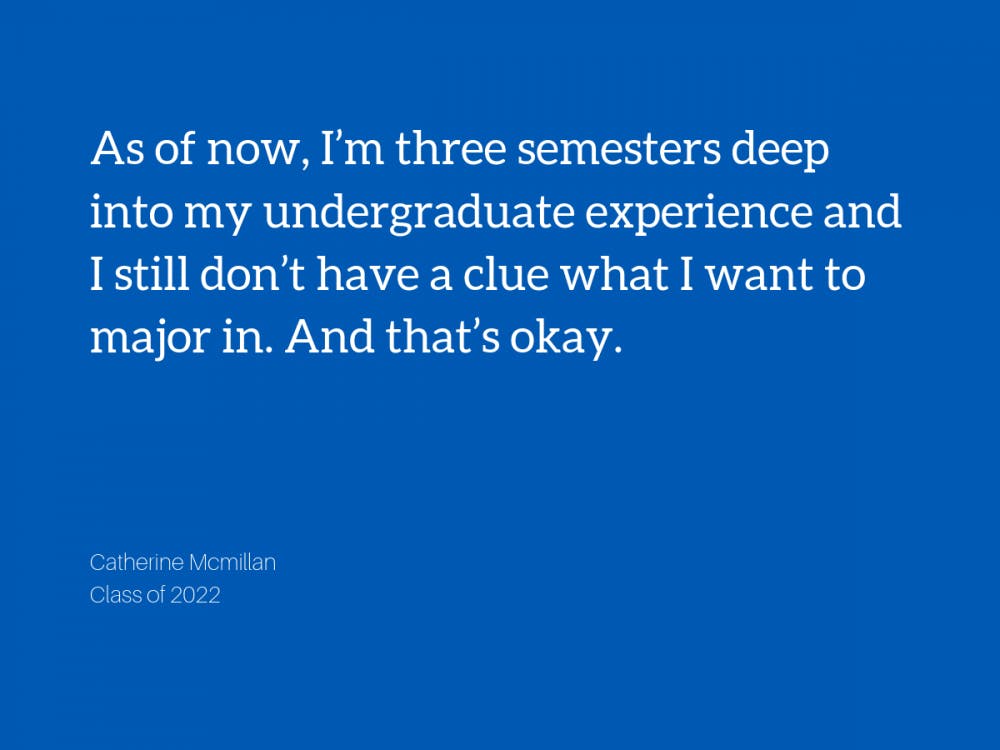“Alright, I have fifteen minutes.”
Sweat beads down my forehead as I storm through the doors of Penn Pavilion, darting from table to table. A mountain of papers rapidly accumulated in my hands: Study Abroad, Academic Resources Center, Psychology, History, Public Policy—the list goes on. I circled the perimeter of Penn twice, making rapid-fire stops to absorb as much insight as possible while knowing that I had to run to my 11:45 a.m. class in three minutes.
The Majors Fair came and went in a flash.
As I sped-walked my way to class, I flipped through the massive stack of handouts clutched tightly in my hands. My mind swept thoughts of insecurity away, a momentary respite only to be reactivated by an ever-lingering reality: I needed to make some concrete decisions, and fast.
Perhaps not-so-coincidentally, the Majors Fair acts as a harbinger for the spooky and quickly-approaching Bookbagging season. And if you’re anything like me, Bookbagging season elapses as a series of avoidant behaviors up until the cusp of the even more terrifying registration window.
When I confirm that multi-factor authentication and click on the ‘Registration’ tab, maybe I’ll glance at some of the disciplinary course offerings. Or, perhaps, DukeHub will be a ubiquitous tab on my desktop, providing assurance but remaining altogether untouched to evade catalyzing the scheduling process.
More likely still, I’ll open Dukehub out of necessity, browse around for a few minutes and quickly flee from the task out of sheer choice fatigue. But inevitably, and much to my dismay, registration hits.
While these specific Bookbagging travails may be largely unique to me, the embedded fears are widely applicable. Am I choosing the right classes? Is this the right major for me? What do I really want to do with my life?
“Alright, I have a semester.”
Granted, Bookbagging and registration are worrying timeframes, marked by midnight pro-con list-making, opinion soliciting from friends and interrogative rate-my-professor searches. But beneath these processes lies a deeper question: “What should I major in?”
A certain cadence seems to mark the interactions I have had with empathetic listeners of my majorless saga.
They begin with the all to-be-expected “What are you interested in?”
“A lot of things,” I reply, unenthused.
“Which are…” they prod encouragingly.
I then proceed to relay a laundry-list of disciplines that have any remote interest to me, exhausting all possibilities until the severity of my quandary is adequately translated.
“Oh, well…” they sputter out in resignation. “Don’t worry—uh, you still have time!”
In the effort to comfort, this illusion of infinite time is at best a petty white lie to quell unease and at worst a false expectation that imposes stress and guilt upon students. Because the reality is that the major declaration deadline for sophomores is just shy of a semester away.
Where’s that infinite time now?
That’s not to say that one is incapable of changing their major after the fact. But the very act of choosing a major has a sense of fatal determinism to it, as if this one decision dictates the rest of your life. This perception is imposed culturally. From the day we are thrown onto East campus as first-years, the two questions we are asked from the get-go are: “Where are you from?” and “What is your major?”
The question directly feeds into the implicit stigmatization of being undecided.
Get The Chronicle straight to your inbox
Sign up for our weekly newsletter. Cancel at any time.
Last semester, I was restless with worry that I was undecided, especially as my peers began to shape up their four-year plans. Although, looking back, it’s a bit ludicrous that some people were so set on an academic trajectory before they even had the opportunity to take any classes.
While categorizing yourself into a “major bucket” can be a heuristic for peers—to gauge interests and grasp if there are any curricular overlaps that are suitable to form study groups, commiserate, or probe for opportunities—there’s not much, if any, added value to posing the question.
Rather than copy-and-paste these dull scripts, I propose a new set of questions, namely: “What excites you?” and “What are you passionate about?” By asking these questions, students can transcend essentializing people down to their major and instead provoke more meaningful conversations on identity and areas of interest.
Yes, these columns have been done before, and will inevitably be written again, but it’s important to reiterate that it is developmentally important and even normal to have these doubts when choosing a major.
As of now, I’m three semesters deep into my undergraduate experience and I still don’t have a clue what I want to major in. And that’s okay.
If you get anything from this column, let it be validation: that your pace, your own academic timeline is unique to you, whether you decide in the first month of classes or change your major four times before junior fall.
You are not your major.
Catherine McMillan is a Trinity sophomore. Her column, "the devil’s archive," runs on alternate Fridays.

